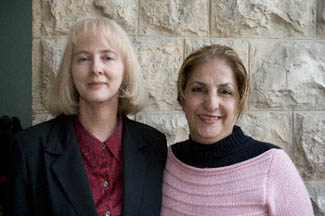

Jordan, day 2 (Thursday)
We began our day with conversation about various aspects of the Iraqi situation. As others staying at the American Center for Oriental Research joined us at the breakfast table our conversation broadened. We met a man who teaches Comparative Religion at a seminary in Austin. He is writing a book on Islam to help explain it to Christians in a way to help build tolerance. We met a Fulbright Scholar studying archeology from ancient times, a woman writing her dissertation on fundamentalism in Islam and others whose story I didn't catch enough of to recite but each seemed to be a scholar of some sort—which is indeed the reason this facility exists.
In the afternoon we met with our Iraqi translator, Amjad, who is himself an Iraqi refugee. First we visited the Webdah School, a school program and family center for Iraqi refugees in Jordan. A lady from the U.S. named Claudia Lefko seemed to be in charge at this time, having helped start it a few months ago, reportedly with $75 raised by a U.S. Brownie troop!
According to the Webdah School, there are as many as one million Iraqis living in Jordan, fleeing from the violence in Iraq. According to the UN High Commission for Refugees estimates, we can assume half of them are children.
 Next, Amjad took us to meet a man who had repaired generators in Bagdad for our military. After he discovered he was being followed and was threatened he fled with his family to Jordan. He left everything behind. His wife, Sundis, had been a hair dresser. Noticing my hair was in bad shape she offered the gift of a hair cut. She said she'd like to tell everyone in the U.S. what a good hairdresser she was. The children, Nawras, age 8, and Naura, age 4, seemed to enjoy this unusual and good-hearted visit. Naura is the "cover girl" on literature about the Wabdah school.
Next, Amjad took us to meet a man who had repaired generators in Bagdad for our military. After he discovered he was being followed and was threatened he fled with his family to Jordan. He left everything behind. His wife, Sundis, had been a hair dresser. Noticing my hair was in bad shape she offered the gift of a hair cut. She said she'd like to tell everyone in the U.S. what a good hairdresser she was. The children, Nawras, age 8, and Naura, age 4, seemed to enjoy this unusual and good-hearted visit. Naura is the "cover girl" on literature about the Wabdah school.
Next we visited Majad, who was a refrigerator engineer in Bagdad, and his wife Maisaa. After ten of his friends' children were kidnapped by gangs for ransom he decided it was time to leave. He has three small children: Miran, Carol and Karam (which means "generosity").
Our last visit of the day was with Ayad, an industrial engineer with a technology degree/certificate. He shared as apartment with Zena, his sister, who also has a certificate in technology. He says he worked for the United Nations Commission for Human Settlement and then the United Nations Development Program. He was responsible for distributing diesel fuel in Iraq. The MEHDI military gang tried to steal fuel to sell on the black market. He was threatened, called a traitor because he was working for the "infidels." He mentioned teaching his sister to use an AK-47 for protection—common practice in Iraq. He and his sister fled to Jordan with their dog, Benji, who is deaf and blind from a car bomb. Ayad has shrapnel in his neck from the same explosion.
When Ayad was asked if he was able to get a Visa anywhere in the world he told us that Pakistan offered him one....if he memorized the Koran and went into nuclear engineering. He said he just laughed.
All the Iraqi refugees we interviewed on this day happened to be Christian. All agreed that the U.S. could help by increasing the number of visas for Iraqis. A lot of good talent is going to waste and a lot of tension is building in the few countries that have been willing to take a substantial number of refugees. Jordan's borders are now closed. No more visas are given. Compare this: 202 visas were given to Iraqis last year by the U.S. while millions were sheltered by other countries.






















